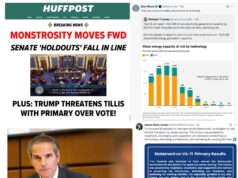With the PROTECT IP (PIPA) bill out for revenge after the failure of COICA, Senator Ron Wyden stands out as a lone Congressional voice for calm and considered action on digital copyright infringement.
Yesterday the Senate Judiciary Committee approved the bill move onto the floor with a stunning unanimous vote. Thankfully, Senator Wyden has kept his ear to the ground on issues of digital due process and copyright and immediately responded to put a hold on the bill.
While Wyden is in a tiny minority opposition amongst his colleagues, public outcry against the bill has been growing. Demand Progress has initiated a petition against the bill with over 60000 signing it already; join us by signing it here. And you can vocalize your opposition along with 3,000 Demand Progress members in calling your lawmakers here.
One of the major proponents of PIPA, the MPAA, made a blunder this week and revealed just how skewed their sense of how the Internet works is. In a post on the MPAA blog they claimed that Demand Progress had “allied” ourselves with Demonoid because they had linked back to our petition. It should be obvious to anyone with even a miniscule understanding of how hyperlinking works that the target site has nothing necessarily to do with the origin.
While this error is almost humorous in its absurdity, it gives us a glimpse into what the MPAA, RIAA and others hope the implications of PIPA will be. Its passage as-is would be “ceding control of the Internet to corporations through a private right of action, and to government agencies that do not sufficiently understand and value the Internet, PIPA represents a threat to our economic future and to our international objectives”, as Senator Wyden said yesterday.
We, like Senator Wyden, agree on the importance of dealing with the issues that PIPA tries, and massively fails, to address: “to protect intellectual property and combat commerce in counterfeit goods”.
However, we as citizens of a democracy cannot and should not put such power in the hands of those who do not properly understand it or may abuse it. Scores of thousands have expressed their support already, but we still need your help. Sign our petition and send a message to Congress.


 Sign up for the Blue Virginia breaking news newsletter
Sign up for the Blue Virginia breaking news newsletter
![Monday News: “Tillis Savages ‘Misinformed’ Trump for ‘Betraying’ Voters”; “Trump’s [Budget] Bill Will Destroy America’s Climate Progress” – and MUCH More!; “What the University of Virginia Should Have Done”; Map of Walkinshaw’s Dominant Victory in VA11](https://bluevirginia.us/wp-content/uploads/2025/06/montage0630-238x178.jpg)





![[UPDATED with Video of the Event] Billboard Truck Highlights GOP Ticket Chaos and Infighting Outside of Winsome Earle-Sears’ Campaign Event](https://bluevirginia.us/wp-content/uploads/2025/07/reidtruck2-100x75.jpg)

![“Attorney General [Jason Miyares] is a coward who refuses to defend our state’s laws [against so-called ‘conversion therapy’] that demonstrably prevent suicide”; “Glenn Youngkin is simply despicable”](https://bluevirginia.us/wp-content/uploads/2025/07/youngkindespicable-100x75.jpg)